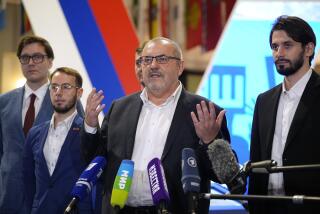Yeltsin Faces Cynical Voters on Campaign Trail : Russia: Tour of modernized ceramics factory shows hurdles he faces: angry citizens and a stalled economy.
- Share via
DEDOVSK, Russia — With risk-fraught elections looming, Russian President Boris N. Yeltsin hit the campaign trail Wednesday, arriving by helicopter at a renovated ceramics factory that represents an oasis of hope on this nation’s crumbling industrial landscape.
Zoya I. Sorokoletova was waiting for him.
“I wanted to see him today to try to understand why I was so wrong when I voted for him in 1991,” said Sorokoletova, 54, who trundled down to the factory on her creaky bicycle to speak her mind to Russia’s first elected president.
“But of course, they wouldn’t let me in,” she said. “As usual, only the ‘chosen ones’ were allowed to tell the president that everything is all right in Russia, that we are ‘slowly but steadily moving toward the victorious completion of economic reform,’ and all that junk,” she said.
Yeltsin’s last foray out to meet the voters was a sanitized and choreographed visit to Ryazan in late March. That trip was cut short when the wan, unsteady-looking president retreated to a dacha instead of continuing a tour of Russia’s troubled heartland.
Wednesday’s trip was billed as a chance for Yeltsin to discuss the progress of economic reforms. The gleaming Dedovsk ceramics factory, which has begun churning out shiny, sturdy, unmistakably un-Soviet tiles using state-of-the-art Italian technology, is as persuasive an advertisement as can be found for sticking to Russia’s still-painful experiment with the free market.
But it is the only factory still running normally in Dedovsk, a town of 60,000 about 20 miles northwest of central Moscow. The local shoe factory and the industrial textiles plant, where Sorokoletova worked for decades to earn a pension now worth $32 a month, both function only sporadically and frequently send their workers on long, unpaid “vacations.”
But poverty, unemployment, corruption, decay, rising crime and a growing gangster presence have taken a toll even in once-bucolic Dedovsk, whose name roughly translates as “Grandfather’s.”
It is hard to find a voter in Dedovsk willing to support either the unpopular president or the two centrist parties formed on Yeltsin’s orders in a bid to unite centrists against the threat of a fascist or Communist victory in the parliamentary elections scheduled for December. The well-organized Communists have won a string of local elections over the past year.
Even the ceramic factory workers, who credited Yeltsin’s administration with handing out the Italian credits that allowed them to modernize their obsolete equipment, said they would not back Yeltsin for reelection in the June, 1996, presidential vote.
“I won’t vote for him again because the last time he said he was running only for five years,” said Sergei Kravchenko, 33.
But he said Yeltsin’s ultranationalist nemesis--Vladimir V. Zhirinovsky, who placed first in Dedovsk in the parliamentary elections of 1993--enjoys little support here today.
Yeltsin emphasized the progress that has been made in stemming Russia’s industrial decline. In May, production rose 4% for the first time in three years. Wednesday’s campaign-trail rhetoric left no doubt that Yeltsin intends to be second to no one in popular appeal.
At the ceramics factory, and later in a visit to a collective farm in nearby Dmitrov, Yeltsin promised to raise tariffs on imports to help Russian producers compete.
Next, the 64-year-old Siberian hammed it up with the collective farm director, discussing the fine points of automated cabbage harvesting and declaring that manual digging of the Slavic staple was a key cause of Russian backaches. And in a bow to farmers and nationalists, who are horrified by the quantities of foreign foodstuffs that are now pouring into Russian cities, Yeltsin defended the merits of Russian vegetables.
“Our produce here is of higher quality than foreign agricultural products,” he declared. “It is less contaminated. And it tastes better than their plastic potatoes. You can’t even chew them, you’ll need new teeth.”
The Russian consumers’ love affair with imported products--especially Western ones--is a job-threatening problem for the 770 ceramics workers.
Using the $13.5 million in Italian credits to pay for imported machinery and $3.5 million raised from the plant’s new private owners to cover construction costs, the factory has become Russia’s only producer of high-quality kitchen, bathroom and construction tiles.
The factory is clean, well lit, quieter and safer. It pays its workers about $150 a month, on time, a better-than-average wage here. And it has not laid off anyone.
Moreover, the engineers insist that their tiles are identical to the costly imported European ones that have found a huge market in Russia as the nation’s new rich set about building themselves posh homes.
But Dedovsk tiles are one-fourth to one-third the price of imports--and that, paradoxically, is why Russians will not buy them.
“They have the idea that the more money they spend, the better it must be,” factory director Vladimir K. Sokolov said.
“Our tiles are aimed at the middle class, which doesn’t exist yet in Russia,” said Alexei Muranov, 37, the plant’s deputy director. “They’re much cheaper than these tiles from Italy, Portugal or Spain--but not so prestigious.
“The buyer takes the tile, turns it over and sees ‘Made in Russia,’ and says, ‘Oh, it must not be any good, Russia can’t make good products,’ ” Muranov said.
An intelligent advertising campaign could change consumers’ minds, but the plant cannot afford to advertise, Sokolov said.
Such problems aside, Yeltsin declared himself so delighted with the plant’s progress that he promised to build five or six more such factories.
“He said he’d never seen such a good tile in his life,” Sokolov said.
More to Read
Sign up for Essential California
The most important California stories and recommendations in your inbox every morning.
You may occasionally receive promotional content from the Los Angeles Times.










